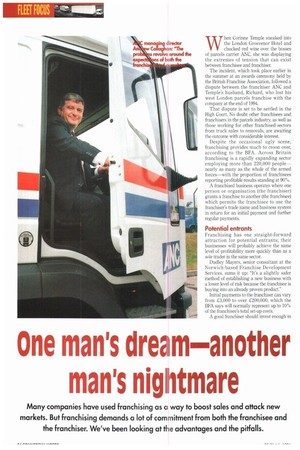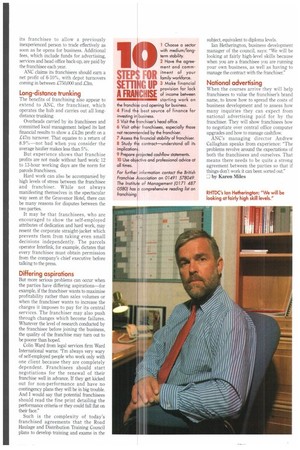W hen Corinne Temple sneaked into the London Grosvenor Hotel and
Page 38

Page 39

If you've noticed an error in this article please click here to report it so we can fix it.
chucked red wine over the bosses of parcels carrier ANC, she was displaying the extremes of tension that can exist between franchisee and franchiser.
The incident, which took place earlier in the summer at an awards ceremony held by the British Franchise Association, followed a dispute between the franchiser ANC and Temple's husband, Richard, who lost his west London parcels franchise with the company at the end of 1994.
That dispute is set to be settled in the High Court. No doubt other franchisees and franchisers in the parcels industry, as well as those working for other franchised sectors from truck sales to removals, are awaiting the outcome with considerable interest.
Despite the occasional ugly scene, franchising provides much to croon over, according to the BFA. Across Britain franchising is a rapidly expanding sector employing more than 220,000 people— nearly as many as the whole of the armed forces—with the proportion of franchisees reporting profitable results standing at 90%.
A franchised business operates where one person or organisation (the franchiser) grants a franchise to another (the franchisee) which permits the franchisee to use the franchiser's trade name and business system in return for an initial payment and further regular payments.
Franchising has one straight-forward attraction for potential entrants; their businesses will probably achieve the same level of profitability more quickly than as a sole trader in the same sector.
Dudley Mayers, senior consultant at the Norwich-based Franchise Development Services, sums it up: "It's a slightly safer method of establishing a new business with a lower level of risk because the franchisee is buying into an already proven product."
Initial payments to the franchiser can vary from 13,000 to over .C200,000, which the BM says will normally represent up to 10% of the franchisee's total set-up costs.
A good franchiser should invest enough in its franchisee to allow a previously inexperienced person to trade effectively as soon as he opens for business. Additional fees, which include funds for advertising, services and head office back-up, are paid by the franchisee each year.
ANC claims its franchisees should earn a net profit of 6-10%, with depot turnovers coming in between £750,000 and £3m.
The benefits of franchising also appear to extend to ANC, the franchiser, which operates the hub and carries out all longdistance trunking.
Overheads carried by its franchisees and committed local management helped its last financial results to show a 1:42m profit on a £47m turnover. That equates to a return of 8.9°0—not bad when you consider the average haulier makes less than 5%.
But experience shows that franchise profits are not made without hard work: 12 to 13-hour working days are the norm for parcels franchisees.
Hard work can also be accompanied by high levels of stress between the franchisee and franchiser. While not always manifesting themselves in the spectacular way seen at the Grosvenor Hotel, there can be many reasons for disputes between the two parties.
It may be that franchisees, who are encouraged to show the self-employed attributes of dedication and hard work, may resent the corporate straight-jacket which prevents them from taking even small decisions independently. The parcels operator Interlink, for example, dictates that every franchisee must obtain permission from the company's chief executive before talking to the press.
But more serious problems can occur when the parties have differing aspirations—for example, if the franchiser wants to maximise profitability rather than sales volumes or when the franchiser wants to increase the charges it imposes to pay for its central services. The franchiser may also push through changes which become failures. Whatever the level of research conducted by the franchisee before joining the business, the quality of the franchise may turn out to be poorer than hoped.
Colin Ward from legal services firm Ward International warns: "I'm always very wary of self-employed people who work only with one client because they are completely dependent. Franchisees should start negotiations for the renewal of their franchise well in advance. If they get kicked out for non-performance and have no contingency plans they will be in big trouble. And I would say that potential franchisees should read the fine print detailing the performance criteria or they could fall flat on their face."
Such is the complexity of today's franchised agreements that the Road Haulage and Distribution Training Council plans to develop training and exams in the Ian Hetherington, business development manager of the council, says: "We will be looking at fairly high-level skills because when you are a franchisee you are running your own business, as well as having to manage the contract with the franchiser."
When the courses arrive they will help franchisees to value the franchiser's brand name, to know how to spread the costs of business development and to assess how many inquiries they can expect from national advertising paid for by the franchiser. They will show franchisees how to negotiate over central office computer upgrades and how to manage cashflow.
ANC's managing director Andrew Callaghan speaks from experience: "The problems revolve around the expectations of both the franchisees and ourselves. That means there needs to be quite a strong agreement between the parties so that if things don't work it can been sorted out."
2 by Karen Miles












































































































